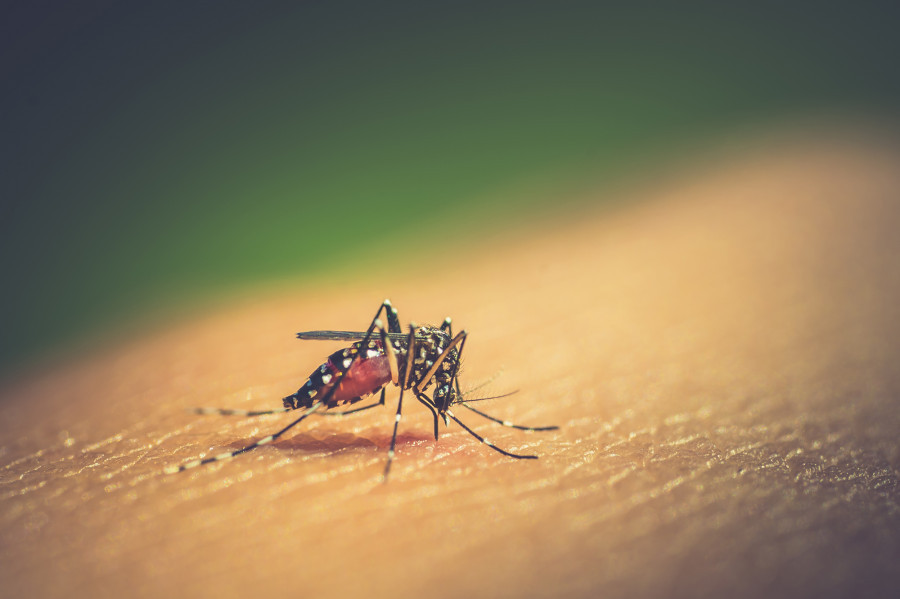
Doctors say Nepal is at high risk of outbreaks of dengue, Chikungunya and Zika viruses, as vectors that transmit the said viruses are already present in almost all districts. Shutterstock
As the risk of outbreaks of vector-borne diseases—dengue, Zika and Chikungunya rises, the National Public Health Laboratory has decided to provide free testing to suspected patients from Tuesday.
The said viruses are transmitted by Aedes aegypti and Aedes albopictus mosquitoes, which have been found in almost all districts of Nepal.
“Until recently, we did not have the reagent to carry out polymerase chain reaction tests for the viruses,” Rajesh Kumar Gupta, spokesperson for the Laboratory, said. “But now we can carry out the tests in our laboratory.”
Officials at the laboratory said that they have acquired a reagent to carry out polymerase chain reaction testing of the said viruses.
The World Health Organisation Nepal has provided financial as well as technical support to acquire the technology to carry out the testing of the said viruses, according to officials.
A risk assessment survey carried out with technical and financial support from the World Health Organisation in 2018 showed that Nepal was a high-risk country for dengue and Zika outbreaks.
Two experts deployed from the UN health agency in Nepal had inspected various localities in the Kathmandu Valley and found eggs, larvae and pupae of Aedes aegypti and albopictus mosquitoes, and warned of the risk of outbreaks.
Every year Nepal records dozens of dengue cases throughout the country. In 2019, seven people died and thousands others were infected with dengue virus in Nepal.
And what is concerning is, neighbouring India with which Nepal shares a long open border, has recorded Zika outbreaks including in 2021.
As thousands of people enter the country every day from India, the chances of the virus spreading into Nepal is high, experts say.
In 2021, health authorities in Kerala state of India declared a state of alert in all districts following the detection of 14 cases of Zika infections.
“Not only from India, but people from all over the world come to Nepal including from the countries that are endemic for the Zika virus,” said Gupta. “We have asked the authorities at the health desk set up at the Tribhuvan International Airport to screen individuals returning from Zika endemic countries. We will also provide free testing on swab samples of suspects if hospitals send us the samples.”
Doctors say Nepal is at high risk of outbreaks of dengue, Chikungunya and Zika viruses, as vectors that transmit the said viruses are already present in almost all districts. And what is needed is a person infected with the viruses for the diseases to spread.
Doctors say Zika virus symptoms match those of the dengue virus—mild fever, rashes, muscle pain, headache, red eyes and general feeling of discomfort.
Zika causes microcephaly, a condition in which babies are born with underdeveloped head and brain damage. Zika is also linked to Guillain-Barre syndrome, a condition in which the immune system attacks the nerves causing muscle weakness and sometimes paralysis.
“It is good that testing for Zika, dengue Chikungunya has started within the country. This is necessary for disease surveillance,” said Dr Sher Bahadur Pun, a virologist, serving at the Sukraraj Tropical and Infectious Disease Hospital. “Plans can be made accordingly, if we know the status of the diseases, and this also helps in taking preventive measures to prevent massive outbreaks.”
Many people infected with the Zika virus show mild symptoms like fever, rashes and red eyes. Studies show that pregnant women and their foetuses are at high risk.
If a mother is infected with the Zika virus during pregnancy, it leads to congenital defects in the newborn, which is called microcephaly. The brain of an infant is small and underdeveloped.
Zika virus was first identified in Uganda in 1947 in monkeys, according to the UN health agency. It was later detected in humans. Brazil saw the worst outbreak of the virus in 2015 and it has then spread to 24 other countries. The WHO had declared Zika outbreak an international health emergency in 2016.
“We are asked to send the suspects returning from abroad to the National Public Health Laboratory for Zika, dengue and Chikungunya,” said Gopal Pandey, a health worker deployed at the health desk at the Tribhuvan International Airport.
The Ministry of Health and Population said that preparations are underway to set up a laboratory at the international airport to carry out rapid testing for travelers returning from disease-hit countries.
“With WHO’s financial and technical support, we are working to set up a laboratory at the airport health desk to carry out rapid testing of suspected cases,” Pandey said. “We have around a dozen lab technicians serving at the TIA health desk.”













